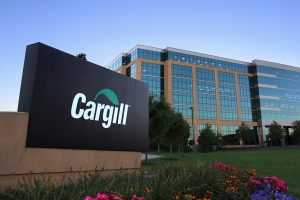


(Posted on 17/06/19)
Cargill has released a collection of sustainability reports across four key businesses: Aqua Nutrition; Cocoa and Chocolate; Ocean Transportation; and Premix and Nutrition.
The 2018 reports reflect Cargill’s comprehensive approach to sustainability, with a focus on creating connections across industry, government and communities that foster meaningful change and workable solutions to the world’s biggest sustainability challenges.
The reports provide insight into how Cargill addresses the impacts of climate change and delivers sustainable solutions that are transparent, innovative and collaborative. In addition, they highlight progress made on specific goals in key areas such as direct sourcing, improving traceability, building up the socioeconomic resilience of farmers and protecting ocean and aquatic life.
“Our work in sustainability focuses on reducing the environmental and social impact throughout our global operations,” said Ruth Kimmelshue, chief sustainability officer for Cargill. “Customers and consumers are looking to agriculture and industry to be part of the solution, protecting both people and the planet. These reports showcase critical efforts on that journey—efforts that increase efficiency in our supply chains, reduce resource use, lessen our carbon footprint and develop products to help our customers do the same.”
Cargill is committed to improving the sustainability of its operations and leading the maritime industry to a more sustainable future. In 2018, the business made important progress toward carbon emissions reduction targets, chartering more energy efficient vessels and preparing for sulphur emissions changes.
Cargill Aqua Nutrition supports the sustainable growth of the global aquaculture industry and its transformation towards more sustainable seafood production..
Cargill is committed to leading the industry towards a thriving cocoa sector, by increasing supply chain traceability, empowering cocoa farmer and tackling pressing issues using the power of technology. The company’s aim is to improve the lives of cocoa farmers and their communities across the five countries where it sources cocoa – Brazil, Cameroon, Côte d’Ivoire, Ghana, Indonesia.
Cargill works collaboratively with partners, farmers and customers to build a socially responsible, environmentally sound and economically viable animal nutrition supply chain. The company’s premix and nutrition division launched critical efforts to improve feed efficiency, reduce emissions and increase transparency.
The National Grain and Feed Association (NGFA) has applauded Senator Deb. Fischer’s (R-Neb.) reintroduction... Read more
Anglo American plc and Teck Resources Limited have received regulatory approval from the Government... Read more
The Rhodes Ridge Joint Venture has approved a $191 million (A$294 million) (Rio Tinto share $96 million... Read more
Trafigura Group Pte Ltd, a global leader in the commodities industry, has announced its financial results... Read more
Rio Tinto has successfully produced the first copper from the Johnson Camp mine in Arizona using its... Read more
The American Soybean Association’s World Initiative for Soy in Human Health programme and the... Read more
Karlka Nyiyaparli Aboriginal Corporation (KNAC) Registered Native Title Body Corporate and Rio Tinto... Read more
OCI Global, a leading global producer and distributor of nitrogen products has announced that it has... Read more
In December 2024, SSAB was granted a permit by the Land and Environment Court at Umeå District... Read more
The President of the Republic of Guinea has joined project partners WCS1, Baowu, Chinalco and Rio Tinto... Read more